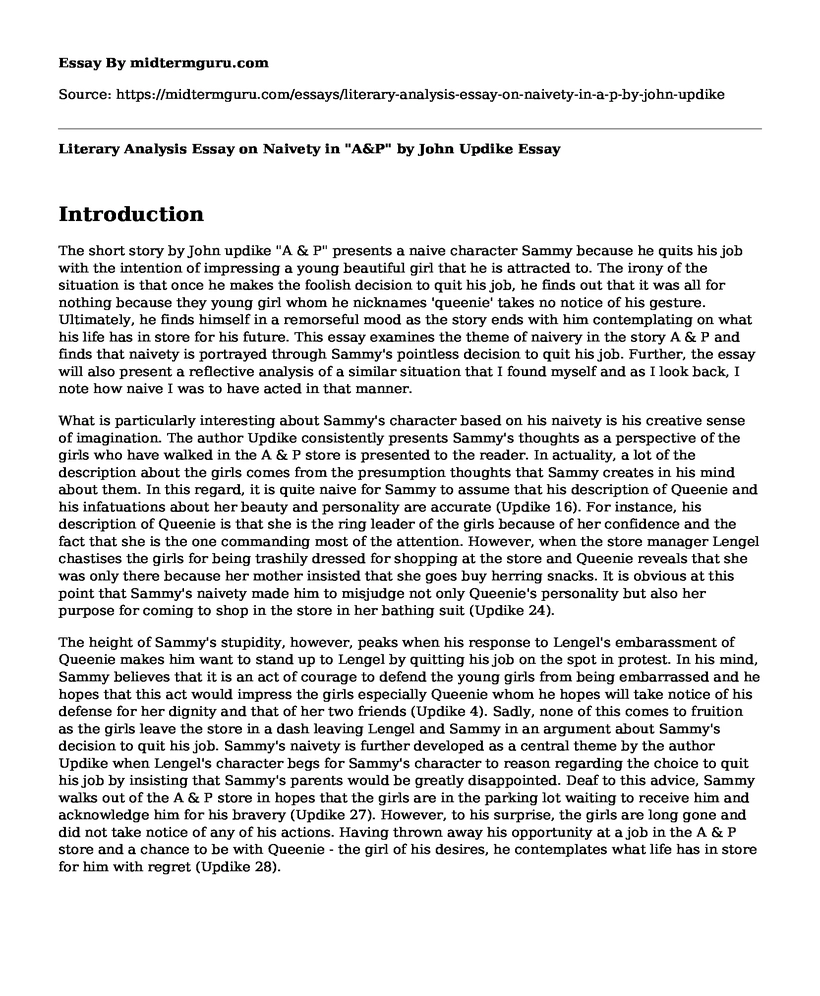Introduction
The short story by John updike "A & P" presents a naive character Sammy because he quits his job with the intention of impressing a young beautiful girl that he is attracted to. The irony of the situation is that once he makes the foolish decision to quit his job, he finds out that it was all for nothing because they young girl whom he nicknames 'queenie' takes no notice of his gesture. Ultimately, he finds himself in a remorseful mood as the story ends with him contemplating on what his life has in store for his future. This essay examines the theme of naivery in the story A & P and finds that naivety is portrayed through Sammy's pointless decision to quit his job. Further, the essay will also present a reflective analysis of a similar situation that I found myself and as I look back, I note how naive I was to have acted in that manner.
What is particularly interesting about Sammy's character based on his naivety is his creative sense of imagination. The author Updike consistently presents Sammy's thoughts as a perspective of the girls who have walked in the A & P store is presented to the reader. In actuality, a lot of the description about the girls comes from the presumption thoughts that Sammy creates in his mind about them. In this regard, it is quite naive for Sammy to assume that his description of Queenie and his infatuations about her beauty and personality are accurate (Updike 16). For instance, his description of Queenie is that she is the ring leader of the girls because of her confidence and the fact that she is the one commanding most of the attention. However, when the store manager Lengel chastises the girls for being trashily dressed for shopping at the store and Queenie reveals that she was only there because her mother insisted that she goes buy herring snacks. It is obvious at this point that Sammy's naivety made him to misjudge not only Queenie's personality but also her purpose for coming to shop in the store in her bathing suit (Updike 24).
The height of Sammy's stupidity, however, peaks when his response to Lengel's embarassment of Queenie makes him want to stand up to Lengel by quitting his job on the spot in protest. In his mind, Sammy believes that it is an act of courage to defend the young girls from being embarrassed and he hopes that this act would impress the girls especially Queenie whom he hopes will take notice of his defense for her dignity and that of her two friends (Updike 4). Sadly, none of this comes to fruition as the girls leave the store in a dash leaving Lengel and Sammy in an argument about Sammy's decision to quit his job. Sammy's naivety is further developed as a central theme by the author Updike when Lengel's character begs for Sammy's character to reason regarding the choice to quit his job by insisting that Sammy's parents would be greatly disappointed. Deaf to this advice, Sammy walks out of the A & P store in hopes that the girls are in the parking lot waiting to receive him and acknowledge him for his bravery (Updike 27). However, to his surprise, the girls are long gone and did not take notice of any of his actions. Having thrown away his opportunity at a job in the A & P store and a chance to be with Queenie - the girl of his desires, he contemplates what life has in store for him with regret (Updike 28).
Conclusion
Consistently, throughout the short story, Updike presents Sammy's character as one whose presumptuous thoughts leads him to not only misjudge situations and misinterpret the what he sees but also makes poor choices that lead him to error. Through Sammy's naivety, Updike manages to portray society's lack of objective analysis of people's situation and personality but instead focus on the stereotypical perspectives that are either inherently in the mind or as a result of societal indoctrination. As such, Updike's portrayal of Sammy's naivety is a call to society's conscience towards objective reason and particularly the need for tolerance by moving away from stereotypical assumptions about others characters, thoughts, or state of being. Essentially, Sammy's naivety is a depiction of society's flaws through stereotypical branding of others based on appearances.
Cite this page
Literary Analysis Essay on Naivety in "A&P" by John Updike. (2022, Nov 05). Retrieved from https://midtermguru.com/essays/literary-analysis-essay-on-naivety-in-a-p-by-john-updike
If you are the original author of this essay and no longer wish to have it published on the midtermguru.com website, please click below to request its removal:
- Essay on Thoughts and Feelings About the Poem: A Little Learning
- The Hollow Men by Eliot - Poetry Analysis Paper Example
- Utopia by Thomas More - Analysis Paper Example
- Critical Essay on "The Tragedy of Julius Caesar" by William Shakespeare
- Essay Sample on Politeness in Evelina
- Character Analysis Essay on Macbeth
- George Orwell's Classic Dystopian Novel: A Warning Against Dictatorship - Essay Sample







